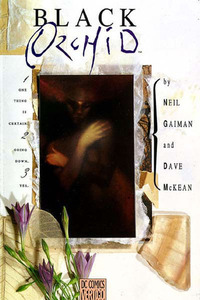Take a photo of a barcode or cover
adventurous
dark
mysterious
reflective
sad
tense
medium-paced
Plot or Character Driven:
A mix
Strong character development:
Complicated
Loveable characters:
No
Diverse cast of characters:
Yes
Flaws of characters a main focus:
Yes
http://greenmanreview.com/book/book_gaiman_blackorchid.html
This is early Gaiman, where the reader can see how good he would become at twisting and turning standard stories, but he didn't have the craft down perfectly. Of particular note is the ending. While Gaiman didn't want to give a standard ending, he didn't manage to come up with something that felt satisfying. A minor character with a few lines steps in to bring the story to a peaceful conclusion that just doesn't feel believable--at best it makes it feel like this can't possible be the end.
Been more than 30 years since I last read Black Orchid, and it holds up. There’s a lot of nascent Arkham Asylum in here, a book that came out less than a year later, and McKean’s art is gorgeous. Great to see Gaiman playing in Alan Moore’s universe, s thing he continued to do all through Sandman.
Gaiman and McKean's work is usually pretty good, and I certainly enjoyed this. The art is, of course, beautiful.
dark
mysterious
reflective
sad
tense
slow-paced
Very pretty to look at but not the best Gaiman' script by a long stretch.
I would probably have liked this better if (a) I had read this closer to when it came out, when it was new and innovative; or (b) was a DC fanatic and caught all the Easter Eggs.
I can appreciate that this is a precursor to Gaiman's classic graphic novel series Sandman, both in Gaiman's writing and illustrator Dave McKean's photorealistic art (used to great effect in Sandman). But while I found both the writings and illustration to work in the complex but self-contained world of Sandman, they both made it much harder to get into the Black Orchid's story within DC's existing universe and I just kept becoming confused and vaguely annoyed.
I can appreciate that this is a precursor to Gaiman's classic graphic novel series Sandman, both in Gaiman's writing and illustrator Dave McKean's photorealistic art (used to great effect in Sandman). But while I found both the writings and illustration to work in the complex but self-contained world of Sandman, they both made it much harder to get into the Black Orchid's story within DC's existing universe and I just kept becoming confused and vaguely annoyed.
Lauded in many quarters for it's "groundbreaking" opening pages in which the hero is killed (that's not a spoiler, honest, it's in the set-up), Black Orchid serves to further cement Gaiman's reputation as an extraordinary storyteller.
Aided and abetted by Dave McKean of Arkham Asylum fame, Black Orchid is a complex and darkly twisted tale set loosely in the DC universe.
Featuring cameos from some Gotham/DC legends, Orchid is as challenging as it is enjoyable.
With the dark, brooding artwork adding weight to Gaiman's narrative, the book proves that graphic novels are not just for kids.
Aided and abetted by Dave McKean of Arkham Asylum fame, Black Orchid is a complex and darkly twisted tale set loosely in the DC universe.
Featuring cameos from some Gotham/DC legends, Orchid is as challenging as it is enjoyable.
With the dark, brooding artwork adding weight to Gaiman's narrative, the book proves that graphic novels are not just for kids.





